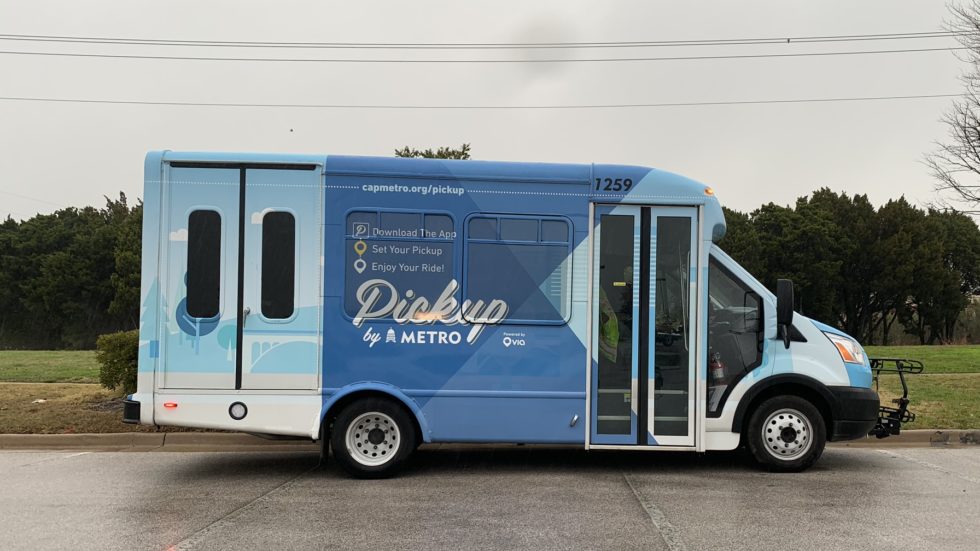With the primaries now behind us, and early voting now a few weeks away, everyone’s attention has been turning to Leander’s big CapMetro vote. I’ve addressed it a little online, but it’s time to put everything out there in one place. Please understand that I am speaking only for myself here: these are the facts as I see them and what my own thoughts were in voting to put this onto the ballot, as well as addressing some of the misinformation I’ve seen repeated as fact online. I can’t know what motivated my fellow Council Members, and I certainly am not speaking on behalf of them, the city, or CapMetro. I’m also not going to tell you how you should vote – this topic is passionate for people on both sides and it’s up to you to decide what feels right for you. We’re all residents and neighbors and no matter what the outcome, those relationships need to continue and remain strong. I’m going to do an FAQ format here so everyone can use it as a quick reference to find the answers to the questions I’m seeing most online.
Why does the city want to get rid of the train?
We don’t. In fact, this entire thing isn’t about the train. That’s right, I’ll say it once more for the people in the back: it’s not about the train. Here’s the issue: There are two ways to get CapMetro service – The first is to be a “Member City” which is what we are. It means that there was an election and the majority of people who voted decided they wanted to be a member city. As a member city, the cost for service is set by the legislature: it’s a fixed portion of what the city would otherwise collect in sales tax. The second way to receive service is to be a “Contract City” meaning that you work out a contract with CapMetro for the service you want at the price you’re willing to pay.
Leander is currently a Member City, meaning that half of what the city would ordinarily collect in sales tax revenue comes straight off the top to cover CapMetro services. There is no contract between the city and CapMetro. CapMetro alone decides the levels of service and the city has zero say. The only way to stop being a Member City is to have an election, exactly the same as becoming a member city in the first place.
I want you all to remember too that CapMetro is more than just the train. For years, Leander had fixed route bus service (which CapMetro discontinued when the trains began). We also have 2 rapid bus lines that take you to Austin. There’s also the very popular Pick Up service – an on demand shuttle that can drive you around part of town. You may have seen them parked next to Kohls when not in use. The Pick Up service launched in 2019 and if you haven’t seen the blue buses, you probably live outside of their small, restricted pick up zone. We’ve asked to have that service expanded so that more residents can take advantage of it, but again, Leander doesn’t get to be the decision maker on the service for our own residents.
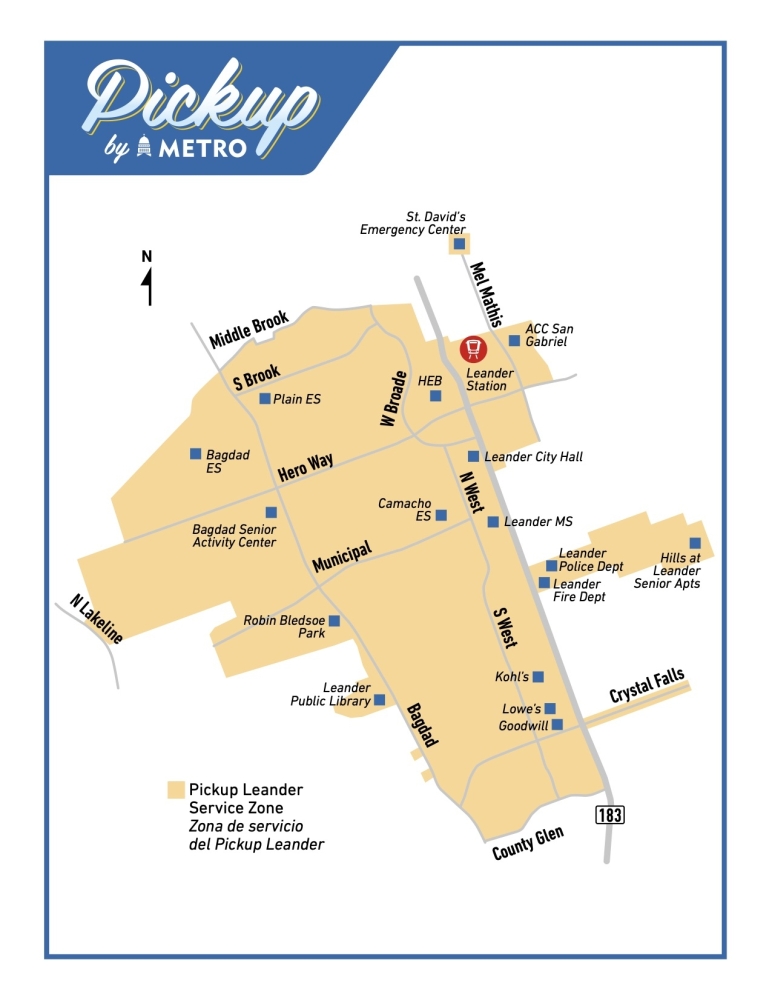
It serves 5 sq. miles. The city of Leander is just under 38 sq. miles.
Can we re-negotiate the contract for services?
There is literally no contract. The percentage of sales tax to CapMetro is fixed by statute and CapMetro alone decides on Leander’s service. As a member city, we have no bargaining power whatsoever and there is nothing to negotiate. Our Mayor Pro Tem did work out a small deal with CapMetro if Leander stays in as a Member City. It isn’t much, but it’s legally all CapMetro can do.
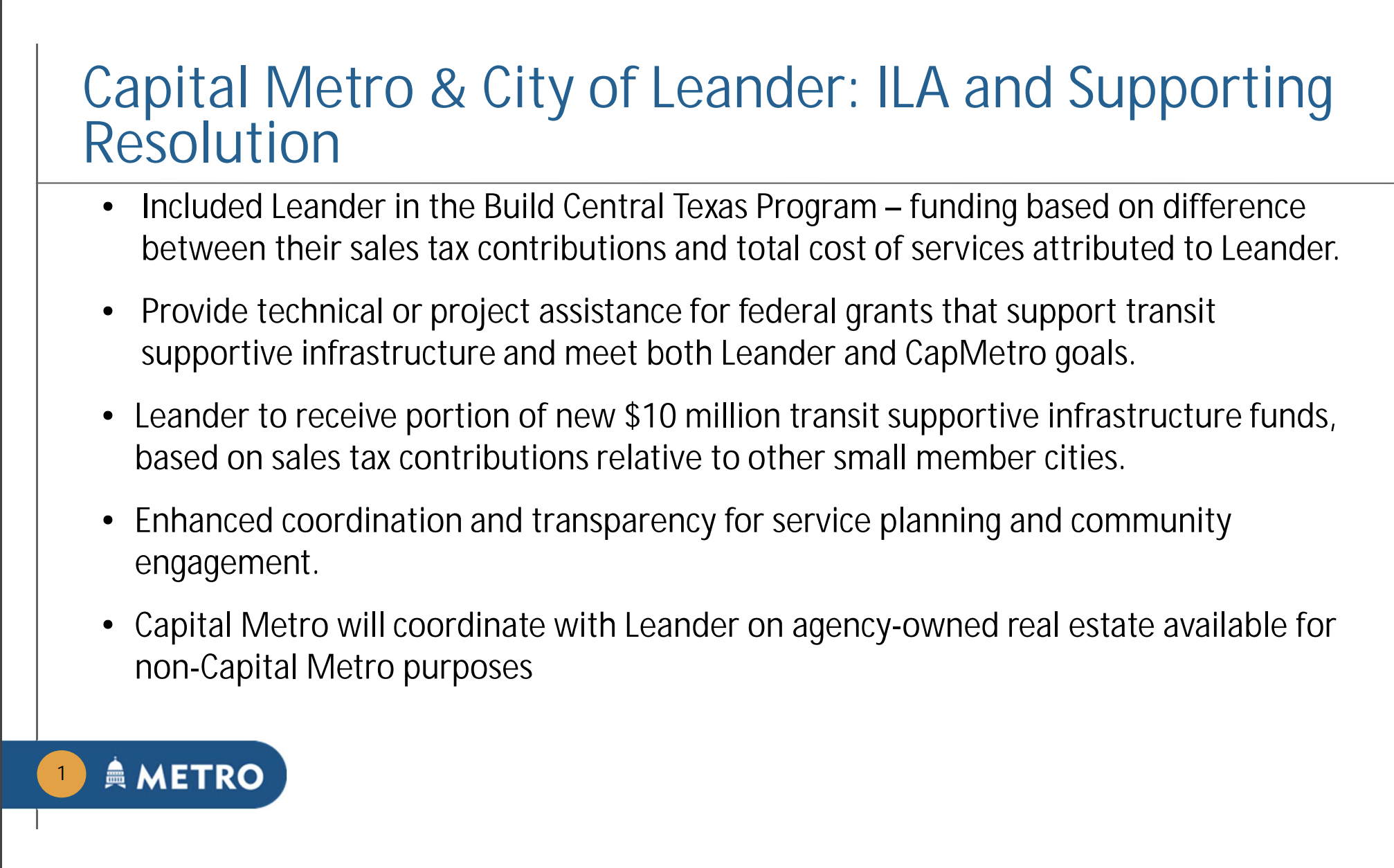
The image above is from CapMetro’s presentation about the interlocal agreement to their board on January 24th, 2022. You can find the entire agenda packet with all the details of the agreement as well as video of the meeting on their website. Here’s a breakdown of what the points in the slide mean:
Include Leander in the Build Central Texas Program – Build Central Texas is a program where CapMetro grants money back to member cities that was paid to CapMetro and is over and above what the city used in services, so long as the city earmarks the money for transportation projects. In theory, we should qualify for it anyway. The reason we haven’t is because the train service is so exorbitantly expensive. In fact, we are the only member city in CapMetro that doesn’t receive some kind of rebate, and yes, I’m including Austin. In order for us to receive this money back, we need to have less costs of service than what we’re paying in over a year in taxes, but remember what I said about that service? As a member city, we don’t have a say in that level of service or it’s costs. The program is nice, but at the end of the day, it doesn’t fix our core problems.
Provide technical or project assistance for federal grants that support transit supportive infrastructure and meet both Leander and CapMetro Goals – This is great. We never have enough staff or money, so having CapMetro’s staff helping us to receive more money is a plus. On the downside for this one, if we weren’t a member city of CapMetro, we would actually qualify for federal funding that we currently can’t capture because CapMetro is the authority and not the city (more on that later).
Leander to receive a portion of new $10 million transit supportive infrastructure funds, based on sales tax contributions relative to other small cities – CapMetro has created this $10 million fund for transit infrastructure that is going to be available to all the small cities. They can’t do something for us without making it available to all, so we would receive a proportional amount of that $10 million to help with infrastructure. It’s a very nice gesture.
Enhanced coordination and transparency for service planning and community engagement – While I appreciate this line, I’m honestly frustrated that more than 30 years into our partnership, this is the kind of thing that needs to be said.
CapMetro will coordinate with Leander on agency-owned real estate for non-CapMetro purposes – This is another one that bothers me on a personal level. This has been the subject of discussion with the city for more than a year, something I even discussed with CapMetro myself last summer, and each time, we have been told that there’s a study and to wait a little longer and a little longer and a little longer. I’ve been personally disappointed in what has felt like carrot-dangling. I appreciate this line in the agreement, but my trust is broken down enough here that I don’t foresee this actually happening in any functional way. I hope I’m wrong.
At the end of the day, the interlocal agreement with CapMetro still leaves us with the same problems we identified earlier: we don’t determine our level of service or our costs. It’s not CapMetro’s fault though, because this is pretty much everything they can legally do because they have to work within the confines of the Texas Transportation Code.
How is transit funded in Texas?
Transit is Texas is funded primarily funded through sales taxes. Cities hold elections to become Member Cities of their local transit organization and then a percentage of what would otherwise be the city’s portion of sales taxes is then collected off the top. The transit organization sets what that percentage is and it must be the same percentage for all cities within the organization. That means that CapMetro can’t say that Leander is going to pay .25% and Lago Vista will pay 1%. Everyone needs to be equal.
This though, is why mass transit in central Texas sucks. Instead of opting in at the county level, we opt in at the city level. This means that cities who already have that money allocated to something in their budget will never be able to afford to become a member city. It’s why we have a patchwork of service in the region instead of a functional transportation system.
How many Leander residents need to get to Georgetown to go to the various county and state government offices? What about Cedar Park to go to the movies or a doctor’s appointment? Guess what: under this funding scheme, you will never be able to do that because both of those cities (as well as Liberty Hill and just about every nearby city you can think of) have allocated that money to other needs in the community. Unless and until the legislature fixes this broken way to fund transit, those cities will never vote to become members. It would bankrupt them.
This entire system creates an unequal playing field for cities and brings up large questions of equity. Unless you are Austin, you are a city that has transit or a city that has money, but you cannot be both. The cities are penalized and ultimately the residents both with and without transit are hurt.
What is the fee to leave CapMetro?
It’s not exactly a fee, but the legislature has provided a calculation for cities exiting Member City status. It’s a bit of a moving target because it’s based on calculations at the point in time of the election – not 3 months before the election, not the day before the election. It’s based on the specific day.
The money is not paid upfront in a lump sum. CapMetro would continue to receive their portion of sales taxes the same way they do now, until the debt is paid off. It’s important to note here too that while the legislature sets a calculation method, typically cities that exit will work to negotiate the amount of the payment and sometimes it goes to litigation. Cedar Park famously challenged the amount they were to pay when they exited several years ago, and according to news accounts, ultimately just did some clever land trades and leases and avoided the penalty altogether. All this to say that the amount is not set in stone.
In 2019, CapMetro told the city the fee to exit was roughly $9 million. That would be less than 1 year of sales tax collections to make the city whole. Now CapMetro calculates our payment at around $42 million. What changed in 3 years? 2 things:
- The Federal government required CapMetro to begin laying a second track from Lakeline to Leander. While Leander pays some of this cost, there is also funding that was paid for it from the federal government.
- Project Connect passed – Project Connect was a ballot measure only within the City of Austin that assessed a property tax on Austin residents to pay for massive expansions to CapMetro service. If you’ve heard about the tunnel underground and the train out to the airport, those are Project Connect issues. It also created a new entity: Austin Transit Partnership. Austin Transit Partnership is like the CapMetro board except it’s for Project Connect implementation. It’s members include CapMetro board members and citizen members from Austin. Leander has no affiliation or representation on that board as Project Connect has no expansions in Leander and we did not get to vote on it. Project Connect, however, is now a part of CapMetro’s overall budget plans and is being counted toward our exit rate.
Side note: you may have heard about Project Connect last week when it was announced that the costs for implementation have now doubled since Austin voters approved the project.
Why can’t everyone in Leander vote on this?
There are a number of neighborhoods that have a Leander address because USPS has designated them that way, but they are not actually within the city limits. Summerlyn, Larkspur, Blockhouse, and Sandy Creek Ranches are among them. Some of you may have come up against this previously when trying to get a Leander Library card or calling for services from police or fire. It may feel unfair to some, but ultimately, we don’t represent those neighborhoods and cannot legally allow them to vote for what happens to the people we do legally represent. It’s also important to note that Leander problems don’t affect these neighborhoods: we don’t handle their roads and they don’t receive our water.
If you aren’t sure whether or not you’re in the city limits, look up your address with either Williamson County Appraisal District or Travis County Appraisal District. If you live within the actual city limits of Leander, you will see the city listed as a taxing entity on your property. It should look something like this:
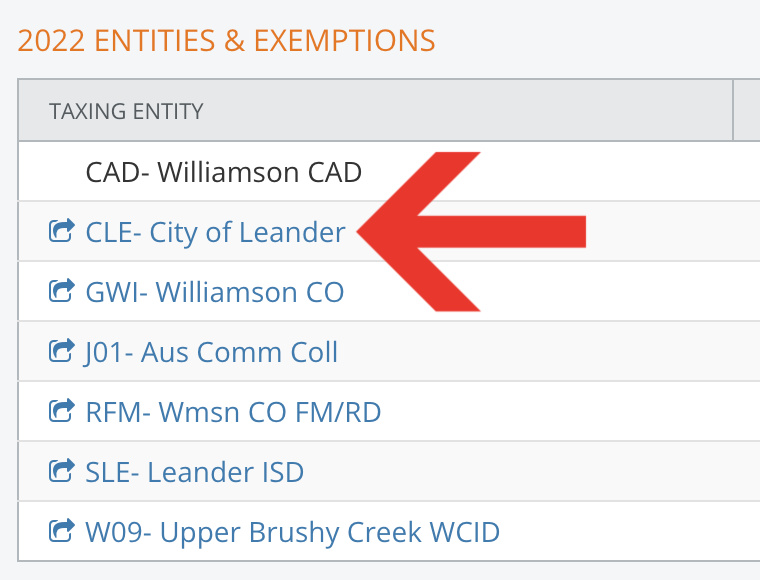
If the city votes out of CapMetro, does service stop on Election Day?
No. Elections aren’t legal until they’re canvassed (final results accepted). This usually takes place a week or two after an election, meaning there will at least be service as usual during that time.
Does the city have a plan for service if we leave CapMetro?
The city is exploring several options. Council is committed to getting current resident users where they need to go at a bare minimum. We’d like to have robust, comprehensive service throughout town (more than what we currently have). Staff is looking at all options and providing updates once a month at council meetings.
We would very much like to look at contracting with CapMetro, however CapMetro is not willing to have those conversations with us at this time. I’m sure I’m not the only Leander resident who’s disappointed in their decision not to engage with us.
What about transportation for the disabled?
The laws on this one are strange. Though CapMetro does not currently provide city-wide service for the disabled, if we move forward without them, we would be required to provide it. Council is also committed to ensuring this happens. Currently, the only service CapMetro provides for disabled Leander residents is waiving the fees on the services they provide to the rest of town – meaning you can ride the train if you can find a way there; and you can ride the pick up bus if you’re in the sliver of town that receives that service. If you live outside that area, there is currently no CapMetro service that will pick you up and take you to your appointments, etc.
Can the city afford to leave CapMetro & provide its own service?
We talked earlier about the costs to exit CapMetro. And obviously if we’re running our own service, there are costs associated with that as well. If the voters choose to leave CapMetro and on the second ballot proposition choose to allow the rest of that sales tax allocation to go to the city’s general fund, it will go a long way in helping us to pay for transportation in the future. Also, with that money going into the general fund, it can help us to cover the costs of running the city – hiring more police and fire fighters, purchasing parkland, maintaining roads, and importantly, improving our water system.
It’s also important to note that by not being a part of CapMetro, the city can become eligible for federal transportation funding. Currently, because we are a Member City with CapMetro, federal 5307 funds for transportation are collected by CapMetro with no obligation for those funds to be spent in Leander at all. In fact, most of the time, those funds are spent elsewhere. If we are not a part of CapMetro, we can file to become a payee and receive that funding for transportation projects ourselves. This has the power to significantly offset the costs of projects we’d love to do in the future that are currently well beyond our grasp without that funding.
Won’t we lose the Build Back Better funding for transportation?
I know of no improvements to Leander transportation from Build Back Better. All of the funding I’ve read about for transportation regionally is headed to Austin. So whether we stay in CapMetro or not, I don’t believe we’ll be impacted.
Have other cities done this before?
Yes. Pflugerville, Cedar Park, Westlake Hills, Rollingwood, and Volente were previously all Member Cities with CapMetro and have voted to exit. Pflugerville currently contracts for Pick Up service. Their pick up zone is 3.5 square miles and it costs about half a million dollars annually, with just under half of that paid through federal funds.
Are you trying to stop growth in Leander?
The decision to put the city’s participation in CapMetro on the ballot had nothing to do with growth. I’ve seen this said a few times but nobody has explained the thinking behind it.
Doesn’t the train increase property value?
I’ve seen this one stated online several times too and don’t know where it came from. I’ve ridden a lot of transit systems in my time and never seen one that goes through high value neighborhoods. Train tracks tend to run along more industrial or inner city type areas. If you want to know if the train or transit increases your home value though, I suggest looking at housing prices in Leander and Cedar Park for an apples to apples comparison. You will see that Leander’s values are not any higher.
Why are you basing this decision on ridership during a pandemic?
We aren’t. CapMetro’s own numbers from Leander have never been very high. We’ve been told for 12 years that ridership was going to go up with growth, but the reality is it hasn’t gone up very much and certainly not at the same rate as the growth of our city. Last year, the council commissioned a study of the system and its ridership. That study found that less than half the people using the Leander station had Leander addresses, and as we talked about earlier, some of those Leander addresses are outside the actual city limits.
What Council looked at was historical ridership. We got the ridership numbers directly from CapMetro – the city didn’t make the numbers up or estimate. We went to the source and asked. You can see the rate of growth for yourself in the slide below. The train never took off in ridership and never topped more than a couple hundred riders per day. The real success of CapMetro has been in bus service, which as we know, is inexpensive and easy to replicate.
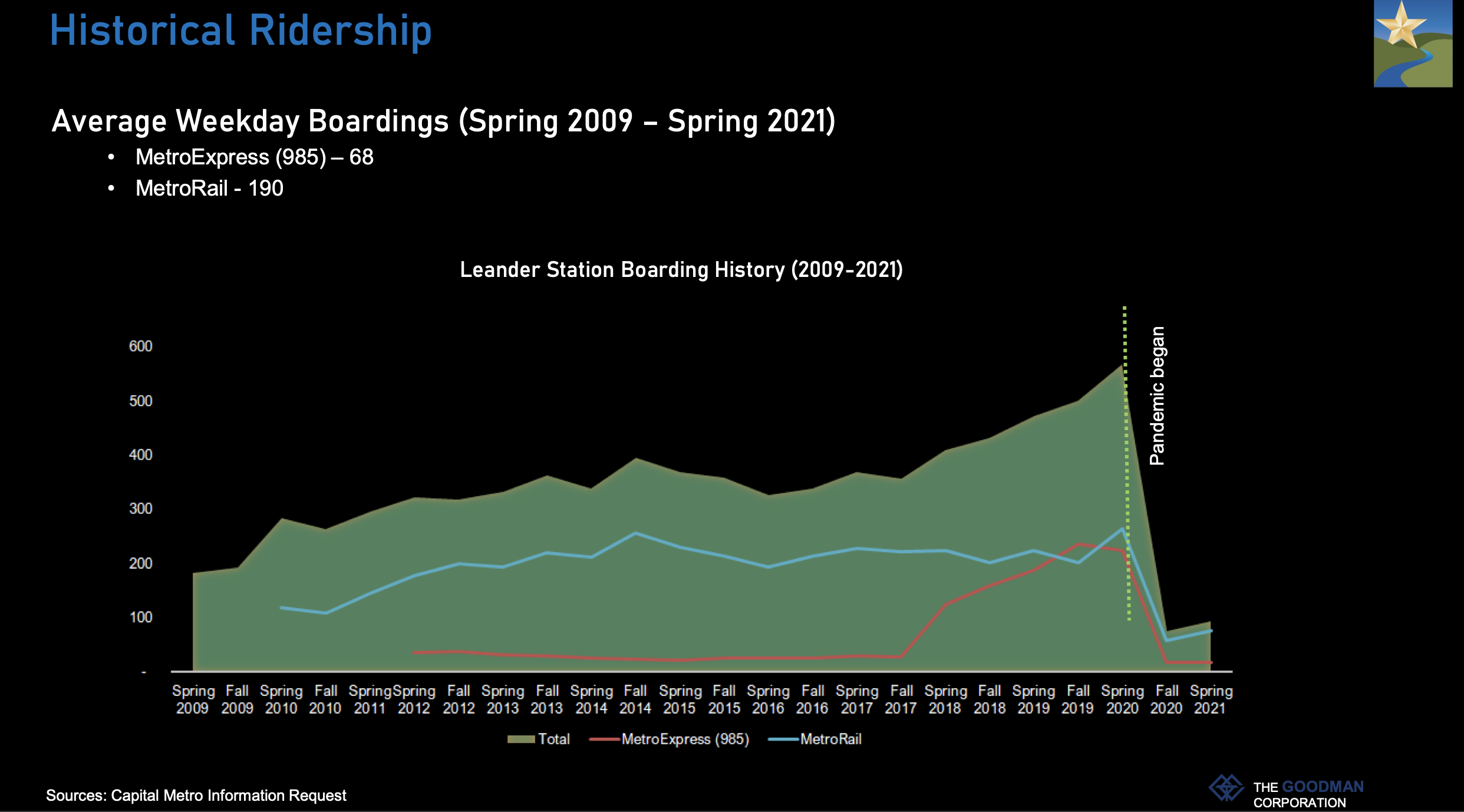
Isn’t the train supposed to go to the airport?
That’s part of Project Connect. It’s still in design and part of that near doubling of costs we talked about earlier. It’s many, many years away from being constructed.
Why can’t the City Council talk about it?
We can, in certain situations. What we cannot do is advocate one way or the other in any way that uses city resources. That means if you’re emailing us through the city’s website or calling our city-issued phones, we can’t really talk about it. If you’re coming up to us inside a city building, we can’t talk about it. This website however is my own, paid for with campaign funds and I’m speaking only on my behalf without endorsement of the city.
What happens if the city votes to stay IN CapMetro?
If we stay in, it’s just business as usual. The services we’ve had will continue uninterrupted. If the city wishes to vote again, they’d have to wait another 5 years to put it on a ballot.
What happens if the city votes to get OUT of CapMetro?
If residents vote to get out, we’ll have about a week or two between election day and the date of the canvass to pull together final plans. There will most likely be two sets of plans being formed: one short term that we can execute as a stop gap the day CapMetro services end, and then one long-term plan that we won’t be able to finalize until after the vote. Like we talked about earlier, CapMetro does not want to discuss what contract services could look like until after the vote. We’re hopeful that they’ll understand the position the city is in and continue to work with us, but in the event that they don’t want to, the city is looking at how to contract with other entities or create a bus service of our own.
If the city exits, we would continue to pay our financial obligation, and most likely begin negotiations on what that obligation looks like. We may not be able to do anything about rail, but we can replicate the same services with buses. There might be some short term reductions in frequency, but we are planning what we’ve wanted all along: a robust transit system that serves all neighborhoods in town. And if we get down the road and decide we want back in as a Member City, we can hold that election and get right back in any time.
What are the pros and cons of staying IN CapMetro?
Pros: We go about business as usual. The city doesn’t have to plan any transit or deal with transportation budgeting.
Cons: We still don’t have a say in our services or what we pay for them.
What are the pros and cons of getting OUT of CapMetro?
Pros: The city could really use the money. Most residents are aware of our water problems and the need for more infrastructure. We also have aging roads and drainage in our older neighborhoods which are coming due for rehabilitation. We need more police, more fire fighters, more ball fields. The other big plus is that we would have the ability to design the transit system that best fits the needs of our residents, and we could do it for less than the $9 million we paid last year.
Cons: We’d need an entirely new department to take on transportation. Money will be tight the first 2 years and I’m sure we’ll have a couple of hiccups. We also have a handful of residents who currently ride the train regularly who will have their lives changed, and that’s a heavy burden.
What are your final thoughts on the whole thing?
There are people on both sides of this that are passionate. This vote is going to impact people’s lives and have large effects on the financial future of the city. My hope is that people will remain civil throughout and understand that we are all neighbors. We need to treat each other with respect, no matter where anybody falls on this vote.
I want you all to know that this council did not take putting this on the ballot lightly. While I can’t speak for my other council members, I know that I am not alone in saying that I would only raise my hand to put this on the ballot if there was a commitment by the city to pick up the slack immediately should the voters decide to exit. My goal is that every Leander resident commuting on CapMetro today is able to continue their normal routine without disruption. I am committed to not leaving you stranded.
I’m also hopeful that if the city does decide to exit, that it will serve as a wake up call to the legislature that the state needs to step up and do a better job of funding transit. At a minimum, transit agency participation should be at the county level to even out services within a region. And entities paying in for services should have a say in the services they need rather than relying on one singular agency to determine.
That’s it from me Leander. Thank you for reading and please make sure you vote your conscience in May.

